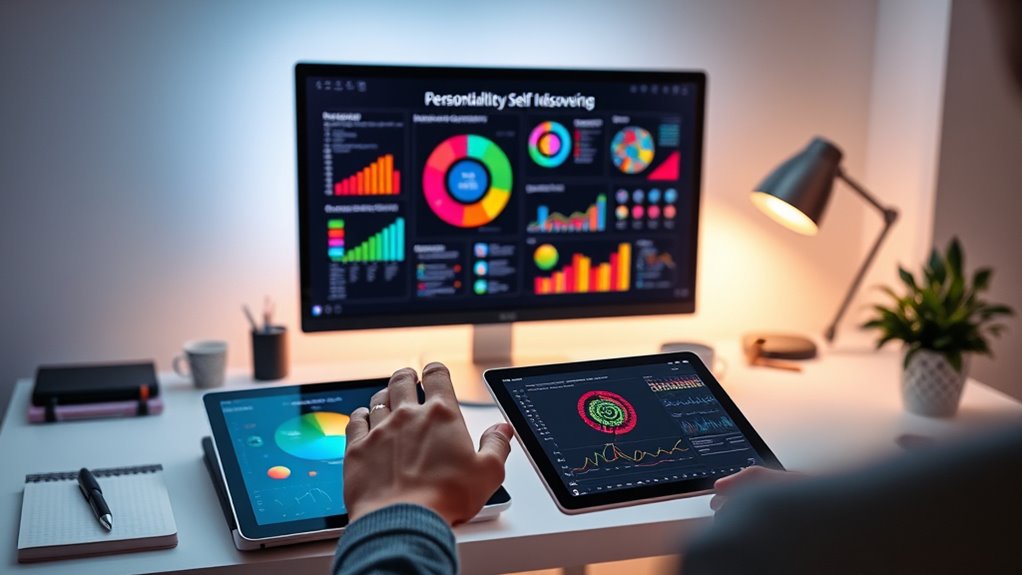AI-powered self-discovery tools analyze your responses, behaviors, and interactions to provide personalized insights into your emotional patterns, habits, and cultural influences. These tools help you understand your strengths and areas for growth by offering ongoing, tailored feedback, enabling greater self-awareness and emotional regulation. With this data-driven approach, you can identify habits, improve communication, and foster personal growth. Keep exploring to discover how these tools can uncover deeper understanding of yourself.
Key Takeaways
- AI-powered self-discovery tools analyze responses and behaviors to provide personalized insights into emotional intelligence and behavioral patterns.
- These tools identify strengths and areas for growth, helping users understand emotional triggers and decision-making tendencies.
- Continuous feedback adapts to evolving traits, offering tailored advice for emotional regulation and resilience.
- Integration of cultural intelligence enhances nuanced self-awareness and interpersonal skills.
- Personalized insights support deeper self-understanding, improved communication, and meaningful personal growth.

In today’s fast-paced world, AI-powered self-discovery tools are transforming the way you understand yourself. These innovative technologies analyze your responses, behaviors, and interactions to help you gain deeper insights into your emotional intelligence and behavioral patterns. When you use these tools, you’re not just guessing about your strengths and weaknesses—you’re receiving personalized feedback based on data-driven analysis. This means you can identify how you typically respond in different situations, recognize emotional triggers, and develop strategies to improve your relationships and decision-making skills.
AI self-discovery tools offer personalized insights into your emotional patterns and responses for meaningful growth.
One of the most significant benefits of AI-driven self-discovery tools is their ability to reveal your emotional intelligence. Instead of relying solely on self-assessment or guesswork, these tools evaluate your capacity to perceive, understand, and manage emotions—both your own and others’. For example, through interactive questionnaires or real-time analysis of your social interactions, they can pinpoint areas where you excel and aspects that might need more attention. As a result, you become more aware of how your emotional responses influence your behavior, enabling you to foster better communication and empathy in your personal and professional life.
Additionally, these tools help you uncover your behavioral patterns. By analyzing your habits, decision-making processes, and reactions over time, they create a detailed profile of your typical behaviors. This insight allows you to recognize recurring tendencies—whether they’re positive or negative—and understand the underlying reasons behind them. For instance, you might discover that you tend to withdraw when faced with conflict or that you often seek external validation. Armed with this knowledge, you can work intentionally to modify detrimental patterns and reinforce healthier ones, leading to more balanced and authentic self-expression.
Using AI for self-discovery is also empowering because it provides continuous, personalized feedback. As you engage with these tools regularly, they adapt to your evolving traits and behaviors, offering tailored suggestions for growth. Instead of generic advice, you receive insights specific to your personality and circumstances, making your self-improvement journey more effective. This ongoing process helps you build self-awareness, which is vital for emotional regulation, resilience, and overall well-being.
Furthermore, integrating insights from Cultural Intelligence can enhance your understanding of how cultural factors influence emotional responses and behaviors, leading to more nuanced self-awareness and interpersonal skills. In essence, AI-powered self-discovery tools equip you with a clearer understanding of your emotional intelligence and behavioral patterns, guiding you toward a more self-aware and emotionally balanced life. They serve as a mirror reflecting your inner world, offering insights that foster personal growth and meaningful change. With these tools at your fingertips, you can navigate your emotional landscape more confidently, making smarter choices and cultivating a deeper connection with yourself and others.
Frequently Asked Questions
How Accurate Are Ai-Driven Self-Discovery Assessments?
AI-driven self-discovery assessments can be quite accurate, but their reliability varies depending on the algorithm transparency and data quality. You should consider how well the assessment’s algorithms reveal their processes, ensuring you can trust the results. While they offer valuable insights, remember that they aren’t perfect substitutes for personal reflection or professional guidance. Use these tools as a starting point, and always evaluate their assessment reliability critically.
Can AI Personalize Insights Based on My Cultural Background?
Yes, AI can personalize insights based on your cultural background by analyzing cultural nuances that influence your behaviors and perspectives. It adapts its feedback to reflect your unique cultural context, offering more relevant and meaningful personalized feedback. This helps you better understand yourself within your cultural framework, making the self-discovery process more accurate and insightful. AI’s ability to contemplate cultural nuances enhances the depth and relevance of your self-awareness journey.
What Are Potential Privacy Risks With AI Self-Discovery Tools?
Imagine your personal insights as a delicate butterfly, vulnerable in a storm. With AI self-discovery tools, privacy risks like data security breaches could cause this butterfly to be trapped or harmed. Ethical concerns arise when your sensitive data is mishandled or shared without consent. You need to be vigilant, ensuring these tools prioritize your privacy, safeguarding your journey of self-understanding from potential threats and misuse.
How Do AI Tools Adapt as My Self-Awareness Evolves?
As your self-awareness grows, AI tools adapt through continuous learning, analyzing your evolving insights and feedback. They use AI adaptability to refine their understanding, offering more personalized guidance. You benefit from these updates by receiving insights that match your current self-awareness level, helping you explore new facets of yourself. This dynamic process ensures the tools stay relevant, supporting your growth journey with tailored suggestions and deeper understanding over time.
Are AI Self-Discovery Tools Suitable for All Age Groups?
AI self-discovery tools aren’t suitable for all age groups due to age appropriateness and accessibility challenges. Younger users may need simpler interfaces, while older adults might face tech barriers. You should consider whether the tool’s design matches your age and comfort level with technology. If accessibility issues exist, these tools can be less effective or even confusing, so it’s essential to choose options tailored to your specific needs.
Conclusion
As you explore personalized self-discovery tools with AI, you’re like a traveler steering through a vast, unfamiliar landscape. These tools serve as your compass, guiding you toward a deeper understanding of yourself. Embrace the insights they offer, knowing they’re tailored to you, much like a custom map. By harnessing AI, you open the door to self-awareness that’s as clear and precise as a well-lit path—leading you to growth and fulfillment.









